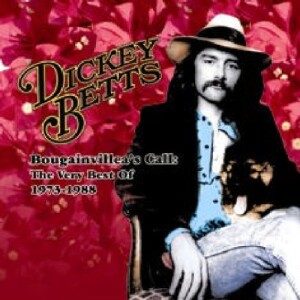 The great guitar-playing member of the Allman Brothers Band will always be remembered as Duane Allman. His real claim to fame is that he played on Derek & the Dominos’ Layla, and that he died in a motorcycle accident in 1971. Richard Betts was the second lead player in the Allmans, he matched Duane’s solos lick for lick, and in fact, was the lead guitarist for the Allmans for a lot longer than Duane ever was. This new collection from Raven Records delivers a career retrospective of some of Betts’ best material, both with and without the Allmans.
The great guitar-playing member of the Allman Brothers Band will always be remembered as Duane Allman. His real claim to fame is that he played on Derek & the Dominos’ Layla, and that he died in a motorcycle accident in 1971. Richard Betts was the second lead player in the Allmans, he matched Duane’s solos lick for lick, and in fact, was the lead guitarist for the Allmans for a lot longer than Duane ever was. This new collection from Raven Records delivers a career retrospective of some of Betts’ best material, both with and without the Allmans.
It starts off with four tunes from his 1974 country album Highway Call. All are original songs and feature Betts’ clear and concise picking overtop a steady southern beat. His down-home tenor is easy to take. Lots of pedal steel, vocal harmonies, and Betts’ guitar playing make “Long Time Gone” and the rest a fine introduction. The Allman Brothers’ “Ramblin’ Man,” his biggest hit, follows. It was released in 1973 and set the tone for the solo work that would follow. Jimmie Rodgers’ “No Hard Times” — which appeared on Highway Call — appears in a live version from 1977. Betts could yodel up a storm, and is that Vassar Clements on fiddle?
Later in 1977, Betts formed a new band called Great Southern and released an album, represented here by the next four tracks. “Out to Get Me” begins with an almost shrieking slide guitar, then a shuffle beat, some harmonica, and a rocking good time. “Great Southern” took the twin lead guitar template from the Allmans and did it again — longtime friend Dan Toler played the second guitar. “Bougainvillea,” with its mellow rhythm and swirling guitars, was co-written by Miami Vice’s Don Johnson (then a would-be songwriter). Billy Joe Shaver’s “Sweet Mama” appears here as played by Betts with Charlie Daniels during one of Daniels’ volunteer jams.
Four tracks from Great Southern’s second album follow. They range from the gorgeous “Atlanta’s Burning Down” (which starts off as an acoustic ballad and builds to an anthem) to the smoldering “Leavin’ Me Again” and the high-powered “Dealin’ With the Devil.” Throughout, Richard Betts proves that he is a fretboard master, incorporating country, blues, gospel and a touch of jazz.
The album concludes with a couple of fiery numbers from the Dickey Betts Band (1988) which show the change a decade can make. Betts’ voice is pushed harder, and the guitar sound is a bit harder-edged, but it still sounds like a logical development from the first 15 tracks. The final track is a tribute to the late lamented Allman brother. “Duane’s Tune” again features twin guitar attack (this time it’s Warren Haynes) on a scorching instrumental. Great stuff.
Bougainvillea’s Call reminds us that there were two great guitarists in the Allman Brothers Band, and it makes an outstanding call for us to pay more attention to the Richard Betts side of the equation.
(Raven, 2006)
